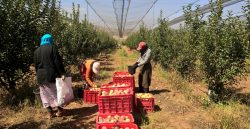Police in Nigeria recently engaged in a raid and rescue action, releasing 76 Ghanian men who had been trafficked there under a fraudulent recruitment scheme. Lured by promises of football contracts with foreign teams and jobs abroad, the BBC reports they instead found themselves trapped in modern slavery. And while releasing people from forced labor is laudable, law enforcement should be putting more emphasis on root cause issues to stop trafficking before it ever takes place.
Victims released, traffickers caught, but…
Using the ubiquitous trafficking model of false promises of a good job abroad seven suspects lured the 76 Ghanian men to travel to Nigeria. However, upon arrival things were not as promised. They were stuffed into overcrowded rooms under poor conditions, said police. All travel documents and mobile phones were seized. The men were then moved to “holding camps.” There they were forced to contact their families and extort money in the guise of paying training or facilitation fees.
The head of Ghana’s Criminal Investigation Department (CID), Lydia Yaako Donkor, said in a press statement:
“The psychological and economic harm caused to these victims and their families is devastating…in many cases, the victims are so malnourished and psychologically affected that they are unable to resume their normal lives.”
And the scam didn’t stop there. The traffickers also used the confiscated phones to get the men’s contact lists. They then scammed the men’s friends and other relatives as well. Lured by false job promises but instead being forced to commit fraud has sadly become pervasive across Asia and Africa.
Indeed, as part of the press statement, the CID boss cautioned families to verify lucrative job offers and educational opportunities abroad before signing up. But warnings and rescues are not enough to effectively address this growing global crisis. More needs to be done.
Sensational stories sell, but at what cost?
The raid and rescue model makes great headlines. The gripping images and narratives help secure donations for anti-trafficking organizations around the world. But there is a price to pay for the satisfaction of using this model to try to “end” trafficking. By directing public attention to this type of activity, it diminishes focus and resources on root causes for this type of exploitation. Root causes that if properly addressed, would prevent people from being trapped in the first place.
Freedom United’s Executive Director Joanna Ewart-James said:
“Placing precedence on the act of rescue dismisses the importance and challenge of victims’ journey to full recovery. Whilst the moment of freedom is celebrated, little attention is given beyond to the future lives of the rescued.”
A recent study done by Pankhuri Agarwal, a Postdoctoral Researcher at the University of Bath found of rescued bonded laborers in India, many were adrift in the legal process for up to 37 years after their rescue while the government determined their status and entitlement to state support. That’s why Freedom United believes empowerment is the most effective anti-slavery strategy. By fostering an environment that protects people from known trafficking vulnerabilities we can end modern slavery, full stop.
Change the game to prevent the players
To empower vulnerable populations, we need to advocate for new laws and regulations that tackle poverty, and systemic prejudices or marginalization. Empowered people can and will resist exploitation. But empowerment is a long process, and long-term legislative goals are not as appealing to donors as stories of raid and rescue.
But as Agarwal points out:
“There is a stark gap between visions of freedom, and the harsh, unfulfilled realities of post-rescue life, which for many is chiefly one of waiting while the law, welfare agencies and government offices process their cases. This waiting means rescued workers are often forced to return to exploitative work.”
Freedom United’s My Story, My Dignity campaign is a movement providing a counter to the sensationalism of raid and rescue. Add your voice to those aiming to stop the perpetuation of this distorted view of modern slavery. Help us keep attention instead on building resilience to stop people from being exploited in the first place.







Freedom United is interested in hearing from our community and welcomes relevant, informed comments, advice, and insights that advance the conversation around our campaigns and advocacy. We value inclusivity and respect within our community. To be approved, your comments should be civil.
I would free the ghanaians